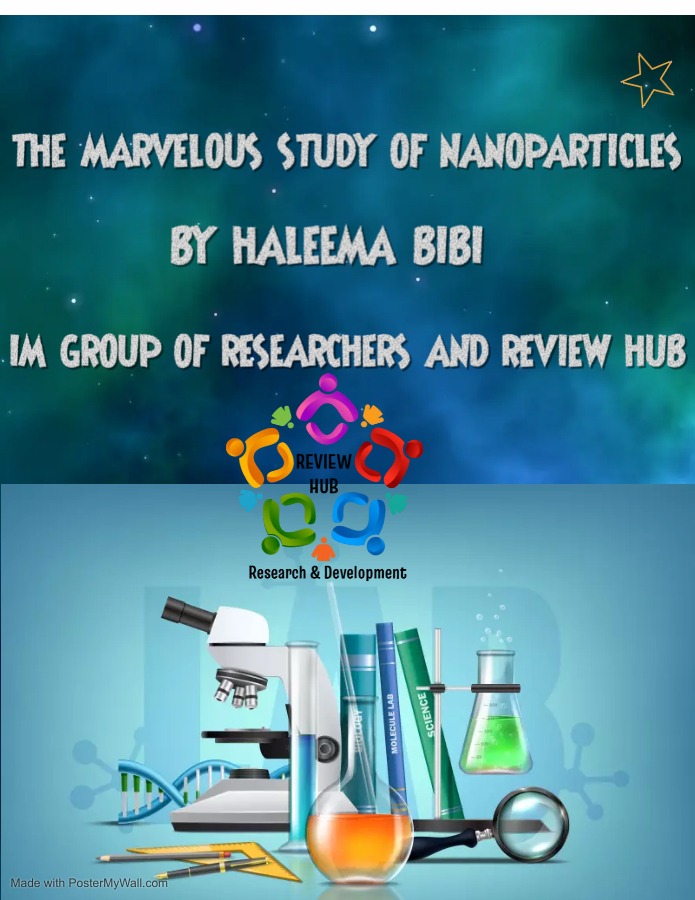Nanoparticles: Unveiling the Miracles of the Tiny World
Consider a universe where everything is contained within a range of 1 to 100 nanometers. This is the realm in which nanoparticles are useful. These tiny powerhouses, created by combining chemistry and nanotechnology, have amazing qualities that go against what we would anticipate from things of a typical size. Let’s embark on an expedition to discover the mysteries of Nanochemistry, delve into the processes involved in producing nanoparticles, comprehend the variety of shapes and sizes of these particles, have a look at how they are observed, and assess the advantages and disadvantages they present in many domains. Read thoroughly, Nanoparticles: Unveiling the Miracles of the Tiny World.
Author: Haleema Bibi
1. Introduction to Nanoparticles:
Nanoparticles are like the silent heroes in the microscopic world, shaping the foundation of nanomaterials. At this tiny scale, unique quantum effects are being appreciated. The fusion of nanotechnology and chemistry throws the spotlight on nanoparticles, promising a range of applications across various scientific frontiers.
2. Scope of Nanoparticles:
Nanoparticles are extremely versatile and can be used in many different scientific fields. They are potential prospects for a variety of applications, from medicinal interventions to electronic developments, due to their size-dependent characteristics. The scope of nanoparticles expands far beyond what regular-sized materials can achieve, opening up a new world of possibilities.
3. Advancements in Nanoparticles:
Recent innovations in nanoparticle research bring precision and versatility to the forefront. Scientists can precisely regulate the size and shape of nanoparticles due to new production techniques. These revolutions allow nanoparticles to become multifunctional and become the crucial point of innovative technology.
4. Methods of Preparation for Nanoparticles:
Crafting nanoparticles is like an art, and there are various methods in the artist’s palette. Whether it’s through chemical precipitation, sol-gel synthesis, or the eco-friendly green synthesis, these techniques let scientists tailor nanoparticles with finesse, controlling everything from their physical features to their chemical makeup.
5. Types of Nanoparticles:
There are numerous varieties of nanoparticles, each one suitable for a particular use. Metals such as silver and gold have a role, semiconductor nanoparticles such as quantum dots offer special optical capabilities, and polymeric nanoparticles give diversity to the toolkit of nanomaterials.
6. Dimensions of Nanoparticles with Examples:
Nanoparticles have multiple dimensions; they don’t just come in one size. The remarkable diversity in this microscopic domain is demonstrated by zero-dimensional quantum dots, one-dimensional nanorods, two-dimensional nanosheets, and three-dimensional spherical nanoparticles.
7. Examples of Nanoparticles:
In this microscopic universe, there are star players like silver nanoparticles, known for their antimicrobial prowess in medicine and consumer products. As a result, nanoparticles i.e. iron oxide play a key role in magnetic resonance imaging (MRI), highlighting the diverse ways in which nanoparticles contribute to technological growth.
8. Characterization of Nanoparticles:
Nanoparticles necessitates knowledge of their characteristics. Techniques like scanning electron microscopy (SEM), dynamic light scattering (DLS), and transmission electron microscopy (TEM) act as magnifying glasses, helping researchers to understand this microscopic world by offering graphical insights into form, distribution and size.
9. Techniques Used to Characterize Nanoparticles:
Characterization includes more than visual inspection. It involves techniques like Fourier-transform infrared spectroscopy, atomic force microscopy and X-ray diffraction. This extensive approach guarantees a profound understanding of the behavior and structure of nanoparticles.
10. Cons of Nanoparticles:
With their exceptional qualities and increased reactivity, nanoparticles offer ground-breaking solutions. Of course, there are considerations with everything. Weighing potential drawbacks, such as toxicity and environmental impact issues, is a necessary part of responsible innovation. Finding a balance is essential to maximizing the benefits of nanoparticles while maintaining their moral and sustainable use.
11. Applications of Nanoparticles:
Nanoparticles find their way into various applications, transforming industries along the way. In medicine, they’re the game-changers in drug delivery and imaging. In electronics, they contribute to the development of advanced sensors and conductive inks. Environmental remediation benefits from their unique properties, showcasing the transformative potential of nanotechnology in shaping our future.
Conclusion:
In wrapping up this journey, nanoparticles stand as captivating ambassadors from the microscopic universe, building a bridge between the tiny and the massive. They help in an era of previously impossible prospects with their exclusive traits and versatility. As we stay to explore the margins of nanotechnology, the proper usage and investigation of nanoparticles give courage for a future in which these minute things will show a crucial role in shaping the path of technology and science.
Also read: Computational Chemistry
Follow Us on

